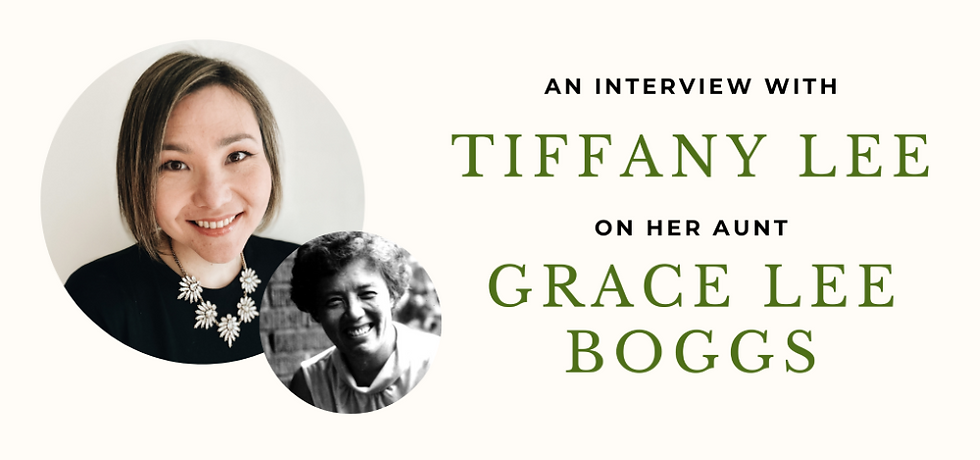An Interview with Tiffany Lee on her Aunt Grace Lee Boggs
- Judy Lee

- May 14, 2024
- 4 min read
Updated: May 16, 2024

“I just so often wish that I could talk to Grace or my dad. I would ask them, when you were 43 years old, were you as worried about the future as I am? She was always looking forward. How can we collectively advance this cause and make things better? And I think that's what made her as powerful as she was even into her later years. I think this would have been a good time for her to be here.”
Tiffany Lee, Grace Lee Boggs’ niece, remembers sitting in the backseat of Grace’s car. She recalls how her Aunt Grace spoke quickly and nonstop as she changed lanes, while simultaneously looking over her shoulder. “Her ideas flowed so quickly and as a 17 or 18 year old teenager, I was struggling to keep up with her. It's just really funny how this very petite woman, who you make these assumptions about because she's older, was just on fire,” she remembers fondly.
Grace Lee Boggs was an influential social justice activist and organizer who, with her partner James Boggs, tackled issues of civil rights, economic justice, labor, feminism, and more. Born in 1915 and earning her Ph.D. in 1940, she authored several books (see below) and started Detroit Summer with her partner, which was eventually established as the James and Grace Lee Boggs Center To Nurture Community Leadership.
While Grace was well known in the social justice sphere, Tiffany didn’t really understand the breadth of her aunt’s work until she was much older. Instead, she just saw Grace as the aunt her single dad frequently relied on for advice and occasional financial assistance. “Do you know how your Aunt Grace, my sister Grace, is a pretty important civil rights leader?” she remembers her dad asking, “I think I was in high school and I rolled my eyes as a teenager.” Growing up Tiffany heard many stories about her dad and aunt’s childhood,
“My dad had the greatest stories…Grace and my grandmother, her mother, didn't really get along super well sometimes and my dad even talks about how she was different from the rest of the siblings. I think she came out just special.”
We spoke at length about how extraordinary Grace was for her time. As an Asian American woman with a Ph.D., Grace was unable to secure work, even in administrative positions, and eventually moved to Chicago where she experienced poverty and the harmful conditions of housing. Tiffany explains how Grace’s experiences influenced her trajectory into social justice work,
“All of these events sort of fell into place and allowed her to ascend to this position of knowing and understanding and having a vision about how things could be. I think that that's the most striking thing about her. Grace just had such an extraordinary childhood living during the Depression, during the wars, and being part of the labor movement in Detroit.”
As Tiffany grew older, she began to understand the impact of her aunt’s work, not just in social justice, but how Grace influenced her own approach to learning. Reading Grace’s books and seeing the documentary, American Revolutionary: The Evolution of Grace Lee Boggs, helped Tiffany. “I had this sort of epiphany that a lot of my work and a lot of my learning and engagement with it professionally…all of my learning and growth are born from discourse and conversations,” she explains adding,
“I think Grace felt really strongly about conversations, about their role in our collective growth and learning…it's not common where people want to engage in those long, often weedy conversations but I always rely on that steadfast belief she held about the importance of conversations and discourse, especially with people that have differing viewpoints. I think that that requires a lot of energy and a lot of resources but when you have those conflicting beliefs and you're trying to reconcile and move forward together, that is really where growth is born and that's something that I'm really proud of.”
Tiffany works in the field of education and one of the lessons she learned from her aunt was to always question why. She reflects, “That’s something I carry with me―to always question and not just accept things. I think that's especially important in education because of education's role in forming and shaping the future.”
Reflecting on the current state of America, Tiffany worries that we’ve regressed and moved backwards as a nation. Looking to her aunt for inspiration, Tiffany believes that Grace wouldn’t be discouraged. She explains,
“She was always looking forward. What do we need to do to mobilize? How can we collectively advance this cause and make things better? And I think that's what made her as powerful as she was even into her later years. I think she would be very motivated and fired up. I think this would have been a good time for her to be here.”
Learn more about Grace Lee Boggs.
Documentary:
Living for Change: An Autobiography
Revolution and Evolution
The Next American Revolution: Sustainable Activism for the Twenty-First Century
Conversations in Maine: A New Edition
This interview was originally conducted in 2023 and has been modified into an article. To see the original interview in question and answer transcript format, visit this link.



